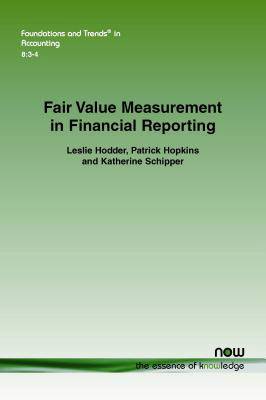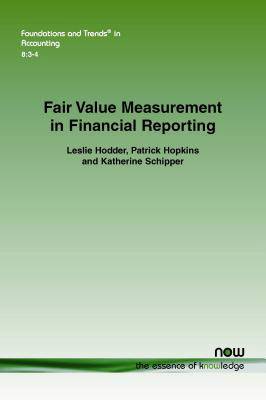
- Afhalen na 1 uur in een winkel met voorraad
- Gratis thuislevering in België vanaf € 30
- Ruim aanbod met 7 miljoen producten
- Afhalen na 1 uur in een winkel met voorraad
- Gratis thuislevering in België vanaf € 30
- Ruim aanbod met 7 miljoen producten
Zoeken
€ 85,45
+ 170 punten
Omschrijving
The purpose of this monograph is to present practical and conceptual issues related to fair value measurement in financial reporting and to evaluate certain research design aspects of empirical research that investigates the information properties of fair value measurement, both in an absolute sense and in comparison to other measurement bases. Although the primary focus is on fair value measurement, the evaluation of existing research and suggestions for future research are germane to researchers interested in examining the information properties of any accounting measurement basis. The 2008 financial crisis increased public scrutiny and brought accounting measurement to the forefront of policy debate, including debate characterized by polarizing rhetoric. Fair Value Measurement in Financial Reporting focuses the discussion on the design and execution of rigorous, inferentially valid empirical research that can inform this debate. The authors begin with a historical overview of the use of fair value measurement based on the writings of prominent nineteenth and twentieth century accounting scholars. Except in the historical overview, the discussion is structured around the conceptual frameworks developed by the Financial Accounting Standards Board and International Accounting Standards Board. This has two advantages: (1) this structure helps to link research to the practical task of setting accounting standards guided by the conceptual framework, and (2) it makes salient some of the difficulties encountered in the design and interpretation of research related to fair value measurement. Following the introduction, section 2 describes the fair value measurement attribute and distinguishes it from "fair value accounting". Section 3 discusses concepts related to the decision usefulness of financial statement elements measured using the fair value attribute. Section 4 analyzes the enhancing qualitative characteristic verifiability in the context of accounting measurement. Section 5 discusses the relation between fair value measurement and macroeconomic effects. Finally, the authors discuss claims that use of the fair value measurement attribute causes procyclical behavior among financial institutions and that accounting standards have become increasingly fair-value-oriented during the last two decades
Specificaties
Betrokkenen
- Auteur(s):
- Uitgeverij:
Inhoud
- Aantal bladzijden:
- 146
- Taal:
- Engels
- Reeks:
- Reeksnummer:
- nr. 27
Eigenschappen
- Productcode (EAN):
- 9781601988867
- Verschijningsdatum:
- 23/12/2014
- Uitvoering:
- Paperback
- Formaat:
- Trade paperback (VS)
- Afmetingen:
- 156 mm x 234 mm
- Gewicht:
- 213 g

Alleen bij Standaard Boekhandel
+ 170 punten op je klantenkaart van Standaard Boekhandel
Beoordelingen
We publiceren alleen reviews die voldoen aan de voorwaarden voor reviews. Bekijk onze voorwaarden voor reviews.











